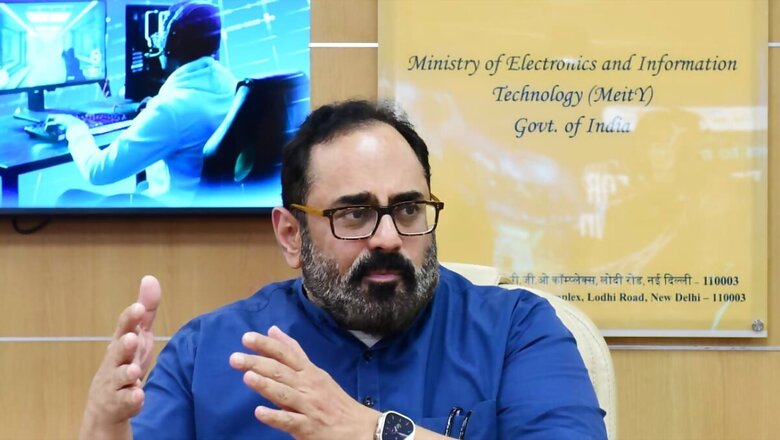
views
The Minister of State for Electronics and IT, Rajeev Chandrasekhar, provided an overview of the ongoing efforts to enhance electronics manufacturing in the country in response to a question raised in the Rajya Sabha on Friday. The minister highlighted the Production Linked Incentive (PLI) scheme for large-scale electronics manufacturing-related investment, production, export, and employment projection for the next five years, as well as significant growth till June this year.
Electronics manufacturing
Under the PLI scheme for large-scale electronics manufacturing, designed to bolster domestic manufacturing and attract investments in the mobile phone value chain, electronics components and semiconductor packaging, the government aims to incentivise eligible companies through a 3% to 6% incentive on incremental sales (over the base year) of goods manufactured within India. These benefits apply to mobile phones and specified electronic components.
“During the scheme tenure [five years], the scheme is expected to contribute investment of Rs 7,000 crore, production of Rs 8,12,550 crore, exports of Rs 4,87,530 crore and generate employment of 2,00,000 direct jobs,” Chandrasekhar said. “Thirty-two applicants are approved under the Scheme. 16 companies were approved in Round-1 (10 companies for Mobile Phones (5 Domestic and 5 Global) and 6 companies for Specified Electronic Components), and 16 companies were approved in Round 2 for Specified Electronic Components.”
It should be noted that till June 2023, the Centre had seen investments worth Rs 6,887 crore, which has surpassed the target of Rs 5,488 crore for FY 2023-24. As per government data, in the same period, Rs 3,30,612 crore worth of production and Rs 1,56,051 crore worth of exports were noticed and over 60,000 direct jobs were created.
Fair quality and trade for domestic products
As per the response in Parliament, Chandrasekhar stated that MeitY has taken proactive measures to ensure the fair quality and trade of domestic products.
The ministry has introduced the “Electronics and Information Technology Goods (Requirement of Compulsory Registration) Order, 2021”, which mandates compliance with corresponding Indian standards for the manufacture, sale, import, distribution, or storage of designated electronic goods or articles.
A total of 64 electronic goods or articles have been notified for mandatory compliance under this order, enhancing the quality and safety standards of these products. This list includes electronic games (video), laptops, scanners, set-top boxes, UPS, mobile phones, power banks, smart watches, digital cameras, Bluetooth speakers, and TV sets.
Consumer protection
It was also stated that in response to concerns about consumer rights and protection, the government has taken steps to establish consumer dispute redressal mechanisms. Under the Consumer Protection Act, 2019, District, State, and National Consumer Disputes Redressal Commissions have been set up to provide efficient and effective solutions for consumer grievances, ensuring fairness and accountability in trade practices.
Furthermore, the Central Consumer Protection Authority (CCPA) has been established under the Act to regulate matters concerning the violation of consumer rights, and false or misleading advertisements, and to uphold the interests of consumers as a whole.

















Comments
0 comment